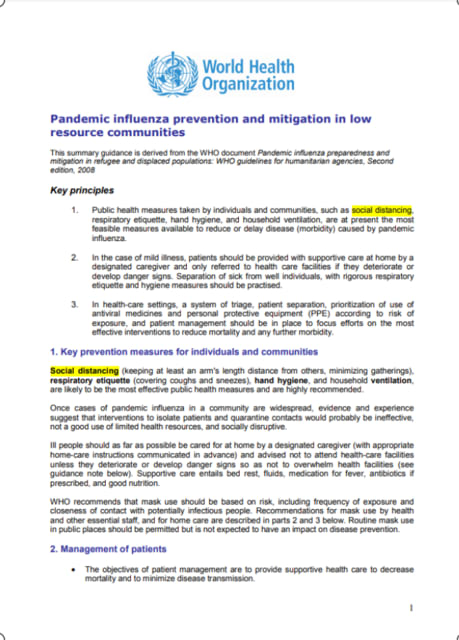医療資源の乏しい国に推奨されているWHOのコロナ対策が、世界に誇る日本の医療のフリーアクセス・国民皆保険制度を壊す心配
コロナ対策について、様々点から点検していますが、ちょっと心配なことに気づきました。
ぜひ、医療関係者のご意見も伺いたいと思います。
いま、日本で行っている「ソーシャルディスタンス」という考え方ですが、WHOは、医療資源の乏しい地域に推奨しているのです。
WHOの文書「Pandemic influenza prevention and mitigation in low resource communities 」をご覧ください。
Pandemic influenza prevention and mitigation
in low resource communities
https://www.who.int/csr/resources/publications/swineflu/low_resource_measures/en/
三密を避け、人と人とが離れたほうが良いという考え方で、いま、日本のコロナ対策が進んでいますが、この間、まちの診療所の経営が厳しくなってきていると聞いています。
こうしたことが続くと、世界が誇るべき医療のフリーアクセスと国民皆保険を実現している日本の医療制度が壊れ、医療のアクセスは、格段に、壊滅的に悪化するのではないかと心配しています。
日本のように、医療資源が豊富で、医療保険制度も整っている国は、重症化したときの体制を整えることが重要なのではないでしょうか。
今のような毎日が続けば、医療機関の経営への影響だけでなく、日本の医療保険体制にも影響するのではないかと心配です。
最悪、アメリカをはじめとした民間医療関係会社(医薬、保険、株式会社病院、、)などが、そこに参入してくる心配もあります。

Pandemic influenza prevention and mitigation in low resource communities
Summary guidance derived from “Pandemic influenza preparedness and mitigation in refugee and displaced populations: WHO guidelines for humanitarian agencies
Key principles
Public health measures taken by individuals and communities, such as social distancing, respiratory etiquette, hand hygiene, and household ventilation, are at present the most feasible measures available to reduce or delay disease (morbidity) caused by pandemic influenza.
In the case of mild illness, patients should be provided with supportive care at home by a designated caregiver and only referred to health care facilities if they deteriorate or develop danger signs. Separation of sick from well individuals, with rigorous respiratory etiquette and hygiene measures should be practised.
In health-care settings, a system of triage, patient separation, prioritization of use of antiviral medicines and personal protective equipment (PPE) according to risk of exposure, and patient management should be in place to focus efforts on the most effective interventions to reduce mortality and any further morbidity.

